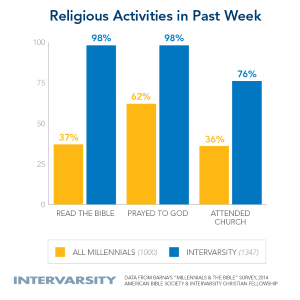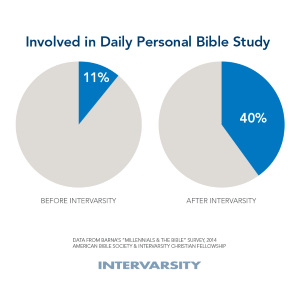In a campus ministry that started with the World War II generation and continued on through Baby Boomers, Gen Xers, and now Millennials, InterVarsity has always prioritized Bible study because Bible study changes lives. New evidence for Bible engagement and transformation has emerged from the survey “Millennials & the Bible,” conducted by the Barna Group on behalf of InterVarsity and the American Bible Society, as well as from an additional survey of InterVarsity students by researchers Terry Linhart and Jen Bradbury.
The just-released Barna survey of Millennials (18- to 30-year-olds) reveals some skepticism among non-Christian Millennials, but overall most still have a high regard for the Bible. Almost half believe the Bible is the actual (21 percent) or inspired (27 percent) Word of God. Only about a quarter of them read the Bible on at least a weekly basis. But among InterVarsity respondents, 87 percent read the Bible on at least a weekly basis.
 Bible reading and prayer are the two top spiritual disciplines practiced by InterVarsity respondents. In the week preceding the survey, 98 percent of InterVarsity respondents had engaged in Bible reading outside of a church service. The top reason given for reading the Bible was to seek “guidance and wisdom.”
Bible reading and prayer are the two top spiritual disciplines practiced by InterVarsity respondents. In the week preceding the survey, 98 percent of InterVarsity respondents had engaged in Bible reading outside of a church service. The top reason given for reading the Bible was to seek “guidance and wisdom.”
Linhart found that nearly 90 percent of those surveyed participated in a weekly small group Bible study, but only 50 percent had engaged in communal Bible study before their InterVarsity involvement. Their view of the Bible changed “from restrictive to life-giving” as a result of their Bible study.
Involvement in InterVarsity also increased daily, personal Bible study (11% before, 40% after). Those surveyed reported that Bible study deepened their faith and that “gaining understanding in Scripture leads to confidence, spiritual excitement, and transformational growth.”
 InterVarsity offers a variety of Bible studies, including GIGs (Groups Investigating God) and manuscript Bible study (using colored pencils to mark and analyze scriptural passages printed without verse and chapter numbers). “Many [respondents] think manuscript Bible study levels the playing field between church kids and non-Christians,” Linhart observed. “They find the participation of non-Christians in InterVarsity Bible studies personally encouraging and unique among Christian organizations.”
InterVarsity offers a variety of Bible studies, including GIGs (Groups Investigating God) and manuscript Bible study (using colored pencils to mark and analyze scriptural passages printed without verse and chapter numbers). “Many [respondents] think manuscript Bible study levels the playing field between church kids and non-Christians,” Linhart observed. “They find the participation of non-Christians in InterVarsity Bible studies personally encouraging and unique among Christian organizations.”
“Bible study is in our DNA,” said Lindsay Olesberg, InterVarsity’s Scripture Engagement Director and the author of The Bible Study Handbook. “I am excited that we now have clear data from external research to confirm that. This information is so helpful as we empower student leaders to reach out on campus and draw their friends into small groups. This data will help us in both evangelism and discipleship.”
More information about InterVarsity Bible studies is available on our Bible studies resource page.
In the minds of many, the Bible remains the bestseller that almost nobody reads. In the case of InterVarsity, the Bible is read and closely studied, resulting in lives that are transformed, campuses that are renewed, and world-changers that are developed.